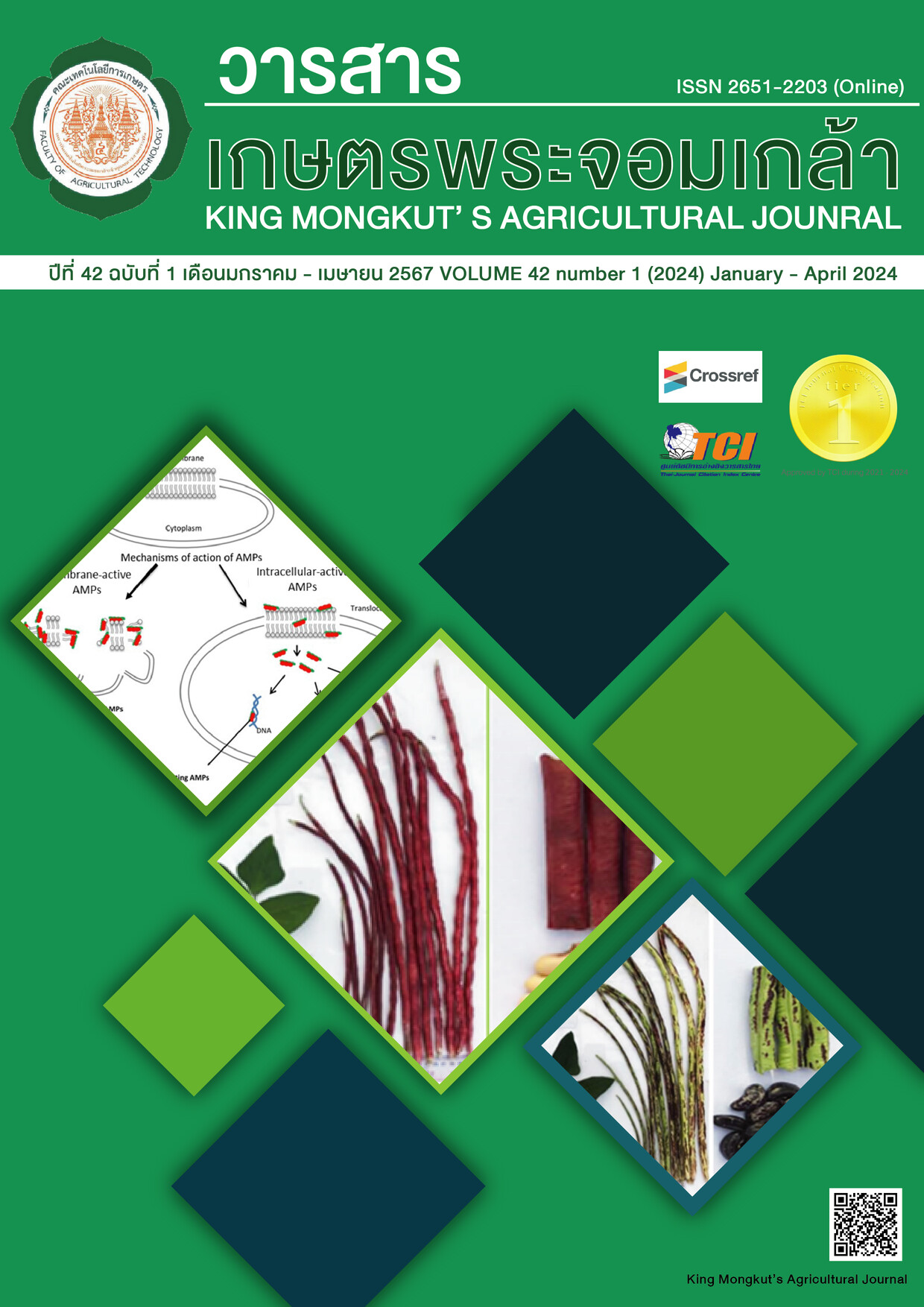ผลของการเสริมใบกระท่อมผงในอาหารไก่ไข่ต่อสมรรถภาพการผลิตและคุณภาพไข่
Main Article Content
บทคัดย่อ
การศึกษาครั้งนี้มีวัตถุประสงค์เพื่อศึกษาผลของการเสริมใบกระท่อมผงในอาหารไก่ไข่ต่อสมรรถภาพการผลิตและคุณภาพไข่ ทำการทดลองในไก่ไข่สายพันธุ์ไฮเซกบราวน์ อายุ 73 สัปดาห์ จำนวน 40 ตัว โดยแบ่งออกเป็น 4 กลุ่มๆ ละ 5 ซ้ำ ๆ ละ 2 ตัว ไก่ไข่จะได้รับอาหารทดลองแล้วเสริมด้วยใบกระท่อมผงที่ระดับ 0, 0.5, 1.0 และ 2.0% ของอาหาร ทำการทดลองเป็นระยะเวลา 8 สัปดาห์ โดยบันทึกน้ำหนักตัว ผลผลิตไข่ น้ำหนักไข่ มวลไข่ ปริมาณอาหารที่กิน อัตราการเปลี่ยนอาหารเป็นผลผลิตไข่ และประเมินคุณภาพไข่ในวันสุดท้ายของการทดลอง ผลการทดลองพบว่า การเสริมใบกระท่อมผงในอาหารที่ระดับ 0.5% มีผลทำให้ผลผลิตไข่ มวลไข่ และอัตราการเปลี่ยนอาหารเป็นผลผลิตไข่ดีกว่ากลุ่มอื่นๆ (P < 0.01) การเสริมใบกระท่อมผงมีผลทำให้ปริมาณอาหารที่กินลดลง (P < 0.01) ในด้านคุณภาพไข่ พบว่า น้ำหนักเปลือกไข่ ความแข็งแรงของเปลือกไข่ ความหนาเปลือกไข่ น้ำหนักไข่แดง น้ำหนักไข่ขาว สีไข่แดง และความสดของไข่ไม่มีความแตกต่างกันทางสถิติ (P > 0.05) ข้อมูลจากการทดลองจึงแนะนำว่าควรเสริมใบกระท่อมผงในอาหารไก่ไข่ที่ระดับ 0.5%
Article Details

อนุญาตภายใต้เงื่อนไข Creative Commons Attribution-NonCommercial-NoDerivatives 4.0 International License.
วารสารเกษตรพระจอมเกล้า
เอกสารอ้างอิง
Chanjula, P., Wungsintaweekul, J., Chiarawipa, R., Rugkong, A., Khonkhaeng, B., Suntara, C., & Cherdthong, A. (2022). Effect of feed
supplement containing dried kratom leaves on apparent digestibility, rumen fermentation, serum antioxidants, hematology, and nitrogen balance in goats. Fermentation, 8(3), 131.
Hanapi, N. A., Azizi, J., Ismail, S., & Mansor, S. M. (2010). Evaluation of selected Malaysian medicinal plants on phase I drug
metabolizing enzymes, CYP2C9, CYP2D6 and CYP3A4 activities in vitro. International Journal of Pharmacology, 6, 494-499.
Kumarnsit, E., Keawpradub, N., & Nuankaew, W. (2006). Acute and long-term effects of alkaloid extract of Mitragyna speciosa on
food and water intake and body weight in rats. Fitoterapia, 77, 339-345.
Parthasarathy, S., Azizi, J. B., Ramanathan, S., Ismail, S., Sasidharan, S., Said, M. I. & Mansor, S. M. (2009). Evaluation of antioxidant
and antibacterial activities of aqueous, methanolic and alkaloid extracts from Mitragyna speciosa (Rubiaceae Family) leaves. Molecular Diversity Preservation International, 14(10), 3964-3974.
Prozialeck, W. C., Edwards, J. R., Lamar, P. C., Plotkin, B. J., Sigar, I. M., Grundmann, O., & Veltri, C. A. (2020). Evaluation of the
mitragynine content, levels of toxic metals and the presence of microbes in kratom products purchased in the western suburbs of chicago. International Journal of Environmental Research and Public Health, 17(15), 1–13.
Sabetghadam, A., Ramanathan, S., Sasidharan, S. & Mansor, S. M. (2013). Subchronic exposure to mitragynine, the principal alkaloid
of Mitragyna speciosa, in rats. Journal of Ethnopharmacology, 146(3), 815–23.
SPSS Inc. (2007). SPSS for Windows, Version 16.0. SPSS Inc.
Suhaimi, F. W., Yusoff, N. H. M., Hassan, R., Mansor, S. M., Navaratnam, V., Muller, C. P., & Hassan, Z. (2016). Neurobiology of kratom
and its main alkaloid mitragynine. Brain Research Bulletin, 126, 29–40.
Takayama, H. (2004). Chemistry and pharmacology of analgesic indole alkaloids from the Rubiaceous plant, Mitragyna speciosa.
Chemical and Pharmaceutical Bulletin, 52, 916-928.
Tsuchiya, S., Miyashita, S., Yamamoto, M., Horie, S., Sakai, S., Aimi, N., Takayama, H., & Watanabe, K. (2002). Effect of mitragynine,
derived from Thai folk medicine, on gastric acid secretion through opioid receptor in anesthetized rats. European Journal of Pharmacology, 443, 185-188.
Vicknasingam, B., Narayanan, S., Beng, G. T., & Mansor, S. M. (2010). The informal use of ketum (Mitragyna speciosa) for opioid
withdrawal in the northern states of peninsular Malaysia and implications for drug substitution therapy. International Journal of Drug Policy, 21, 283–288.
Wungsintaweekul, J. (2017). Kratom. Retrieved from: https://kratom.sci.psu.ac.th/knowledge/interdisciplinary/3197/.


